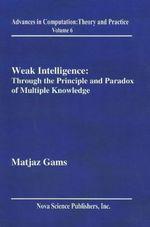
NEWS: Chatbots.org survey on 3000 US and UK consumers shows it is time for chatbot integration in customer service!read more..
Weak Intelligence: Through the Principle and Paradox of Multiple Knowledge

This book deals with minds and machines. Viewpoints of Roger Penrose, Marvin Minsky, Gerald Edelman and several others are analysed. The key question is related to differences between digital computers and human minds through analyses of Gödel’s theorem, Turing machines, Church’s thesis, Wegner’s ideas and evolutionary principles. A new cybernetical principle of multiple knowledge is introduced. Like the Heisenberg principle, which introduced a theoretical foundation for quantum physics, the principle of multiple knowledge provides a theoretical and philosophical background for a new scientific discipline – weak artificial intelligence. At the same time it eliminates current digital systems, however fast and of whichever storage capabilities, as candidates for achieving the kind of intelligence humans or even other animals possess.
This book introduces the first valid formal proof that humans are superior to computers. The subject has been of great interest to humans, but no verifiable conclusions were generated so far even by great scientists like Penrose or Minsky. An overview of major debates regarding the mind-computer debate is presented. In particular, Peter Wegner is seen as the first one to formally show that the universal Turing machine is not the universal computing machine, and that stronger mechanisms are abundant in real life. The new proof comes in the form of the cybernetic principle of multiple knowledge and in relation to the multiple-worlds theory. The advanced mechanism that is suspected behind the true intelligent performance is still a mystery, but several consequences can be derived. Among others, a classical computer can not approach true human performance while agent systems in principle could. The new cognitive weak artificial intelligence is described as a new research discipline based on the above ideas. There is no reason why this discipline would not produce truly intelligent machines in a couple of decades.
New Comment
Only registered members are allowed to comment. or login
or login
